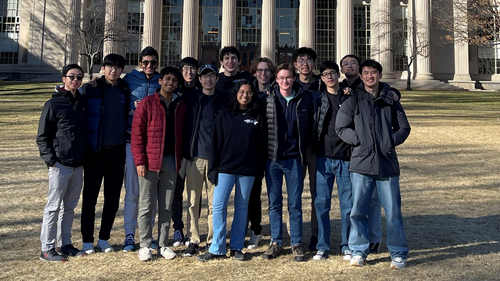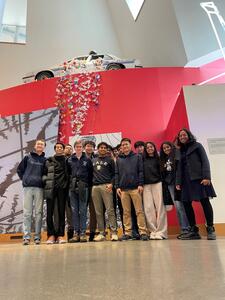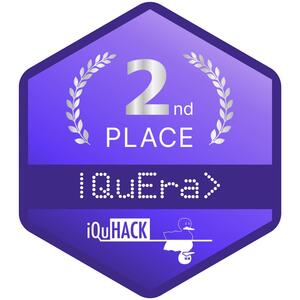
Yale Undergraduate Quantum Computing (YUQC) organized a trip consisting of about 25 students to MIT’s annual quantum hackathon: iQuHACK. Because quantum computing is an interdisciplinary field, students of a wide range of majors–from physics to computer science to math–registered for this event to tackle a quantum-related coding project. At iQuHACK, Yale was represented in several teams, both all-Yalie and mixed, competing in various challenges presented by different companies. Yale students secured first place in Moody’s Analytics’ and Quandela’s challenges; and second place in QuEra’s. Yale teams also placed first and third in IBM Quantum’s challenge. Additionally, Yale team Bulldogs won the overall Social Impact prize.
 Several physics students were part of the group that attended including declared majors: Mason Abrell YC’26, Global Affairs and Physics majors; Jeb Cui YC’26, Computer Science and Physics (Intensive) majors; Christian Kang YC’26, Physics (Intensive) major; Quazi Rumman Rahman YC’25, Physics (Intensive) major; Pranet Sharma YC’26, Physics (Intensive) and Economics majors; and Zachary Zitzewitz YC’26, Physics (Intensive) major. The group also included several prospective majors from the class of 2027: Tyler Chen, Landon Hellman, Archit Kalra, Nicholas Lee, Oliver Lin, Diya Naik, Pradyun Solai, Jeffrey Wei, Jared Wyetzner, and Annli Zhu.
Several physics students were part of the group that attended including declared majors: Mason Abrell YC’26, Global Affairs and Physics majors; Jeb Cui YC’26, Computer Science and Physics (Intensive) majors; Christian Kang YC’26, Physics (Intensive) major; Quazi Rumman Rahman YC’25, Physics (Intensive) major; Pranet Sharma YC’26, Physics (Intensive) and Economics majors; and Zachary Zitzewitz YC’26, Physics (Intensive) major. The group also included several prospective majors from the class of 2027: Tyler Chen, Landon Hellman, Archit Kalra, Nicholas Lee, Oliver Lin, Diya Naik, Pradyun Solai, Jeffrey Wei, Jared Wyetzner, and Annli Zhu.
Winning group projects
Quera 2nd place: Qubit Questers
 The Quibit Questers, Matthew Marsicano (Northeastern University), Adam Godel (Boston University), Alexander Poulin (Northeastern University), Maximilian Rieger (physics graduate student), and Archit Kalra YC’27, competed in QuEra’s challenge, which focused on using a quantum algorithm to help solve the maximal independent set problem. One way of viewing this problem is finding optimal Dunkin’ Donuts locations, such that the number of stores in a region is maximized without putting them too close to each other and causing competition. They were trying to see if there was an advantage to using a quantum computer as opposed to a classical one to solve higher-order versions of this problem for arrays of Rydberg atoms. They found applications of this problem to modern bioengineering and drug design, especially for biologics where the optimal arrangement of certain domains could lead to a more effective medicine.
The Quibit Questers, Matthew Marsicano (Northeastern University), Adam Godel (Boston University), Alexander Poulin (Northeastern University), Maximilian Rieger (physics graduate student), and Archit Kalra YC’27, competed in QuEra’s challenge, which focused on using a quantum algorithm to help solve the maximal independent set problem. One way of viewing this problem is finding optimal Dunkin’ Donuts locations, such that the number of stores in a region is maximized without putting them too close to each other and causing competition. They were trying to see if there was an advantage to using a quantum computer as opposed to a classical one to solve higher-order versions of this problem for arrays of Rydberg atoms. They found applications of this problem to modern bioengineering and drug design, especially for biologics where the optimal arrangement of certain domains could lead to a more effective medicine.
Moody’s 1st place: <Y|quack|H>
Team <Y|quack|H>, Zachary Zitzewitz YC’26, Victor Cai (Harvard), Jeb Cui YC’26, Christian Kang YC’26, and Mason Abrell YC’26, competed in Moody’s Analytics’ challenge, which was to build a quantum portfolio optimizer algorithm, from start to finish, and prepare a pitch on why companies should invest in quantum today. The final algorithm used quantum annealing to solve QUBO-formulated mean-VaR portfolio optimization problems. This team’s algorithm was tested using simulated annealing and on real quantum hardware using D-Wave Systems’ quantum annealer 2000Q. Their algorithm’s optimized portfolios lead to projected returns of up to 6% per business quarter.
Quandela In-Person 1st place: Yale Varsity Clash Royale
The Yale Varsity Clash Royale team, Jeffrey Wei YC’27, Oliver Lin YC’27, Tyler Chen YC’27, Nicholas Lee YC’27, and Jared Wyetzner YC’27, competed in Quandela’s challenge. The goal was to find the optimal parameters for two quantum circuits using a quantum generative adversarial network (QGAN) model. They implemented and simulated quantum circuits to take in a pair of photons as a ququart and transform it into a new state that depends on its parameters. Then, using that implementation, they developed and trained their own QGAN model. This team made a stochastic descent function and a custom loss function based on the ququart “difference” between any generated output and the target state. With multiple training runs and optimizing for different measurements, their best-performing model ran at 99.9% fidelity. In addition, this team also worked on bonus challenges, including modeling noise and trying alternative implementations.
IBM Quantum 1st place and Social Impact Award: Bulldogs
Team Bulldogs, Alma Alex (Yale ‘27), Annli Zhu (Yale ‘27), Siona Tagare (Yale ‘26), Shannen Espinosa (Northeastern ‘25), competed in IBM Quantum’s challenge, which was to design and build a cloud-based, quantum-powered application that addresses a real-world problem and is accessible to end users. Their project QuAllocation is a mobile app that creates matches between organ donors and patients in order to maximize total patient compatibility. They created a user-friendly app interface that allowed users to input basic health information such as blood type, age, and health history, as well as the urgency of their situation. Compatibility scores between each patient-donor pair were calculated classically based on this information. To create the optimal pairs, this team developed a recursive solution to the matchmaking problem through a novel application of the max-cut algorithm (finding graph partitions that maximize the weight of edges between nodes of different groups). They then implemented this using the Quantum Approximate Optimization Algorithm (QAOA) in Qiskit on IBM’s real quantum hardware. Finally, the created matches were sent back to the user, allowing them to view their matches instantly. Team member Annli noted that they were one of the very few all-female teams.
IBM Quantum 3rd Place: Hyperposition
Team Hyperposition, Pranet Sharma YC’26, George Holm YC’26, Brennan Lagasse YC’26, Frank Wong YC’27, and Diya Naik YC’27, also competed in IBM Quantum’s challenge. Their project ‘Alqorithm’ enables users to construct the building blocks of quantum algorithms that can outperform classical computers through quantum signal processing. In the process, they developed an accessible introduction to this procedure and demonstrated its utility for applications from graphing functions to inverting matrices. They were also able to conduct the first demonstration (to their knowledge) of quantum signal processing using superconducting circuits, a promising result for noisy intermediate-scale quantum computing.
In addition, five Yalies were invited (and bankrolled) to compete in the NYUAD quantum hackathon in Abu Dhabi in April: Siona Tagare, Alma Alex, Annli Zhu, Pranet Sharma, and Brennan Lagasse.